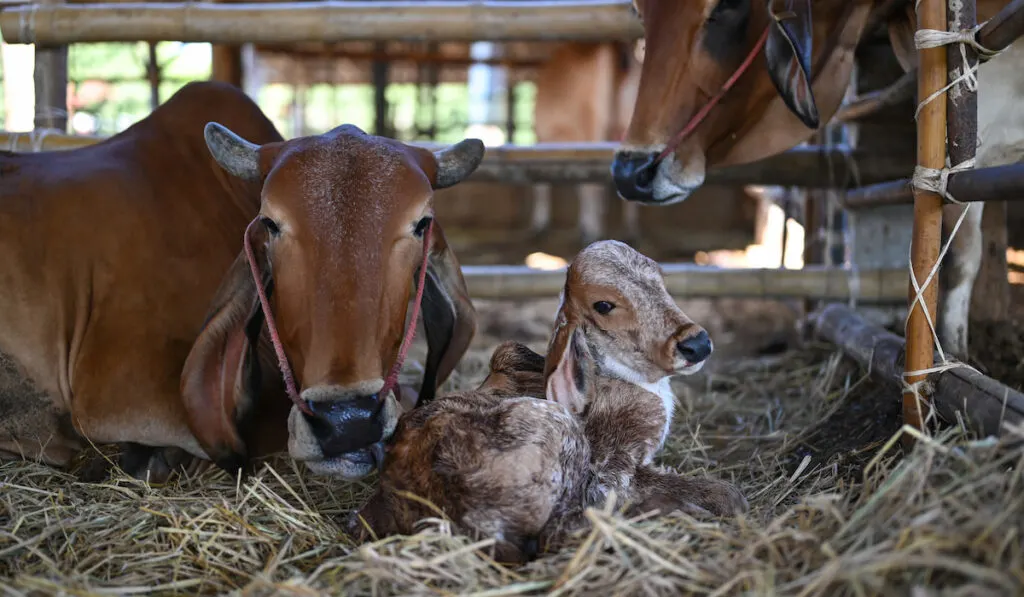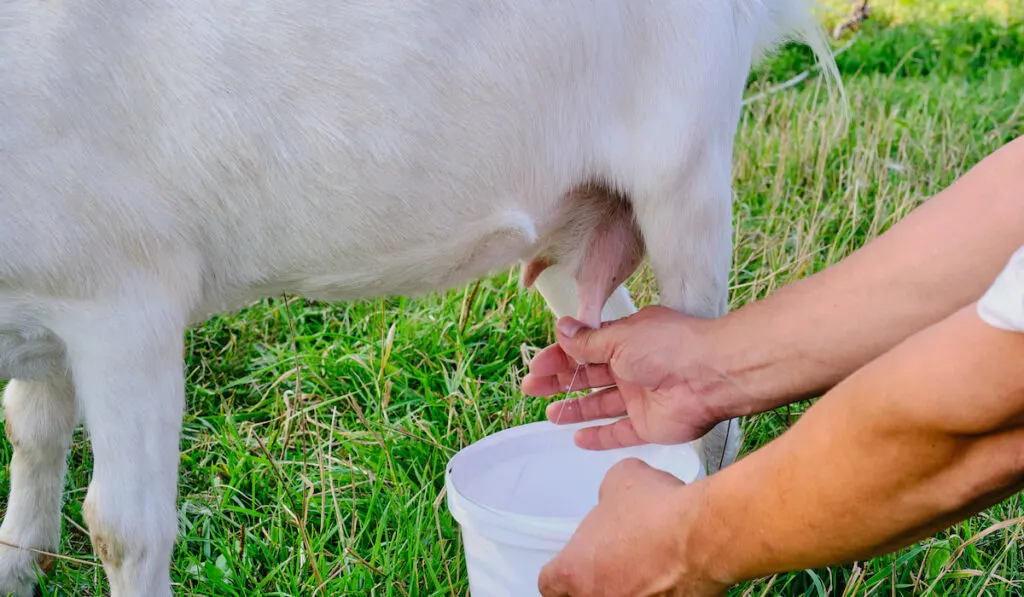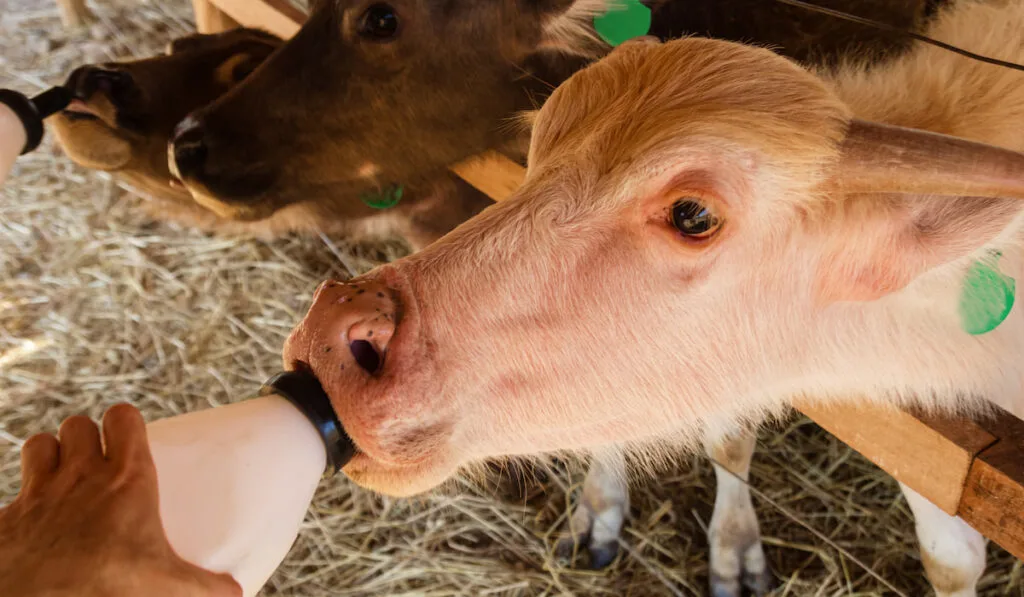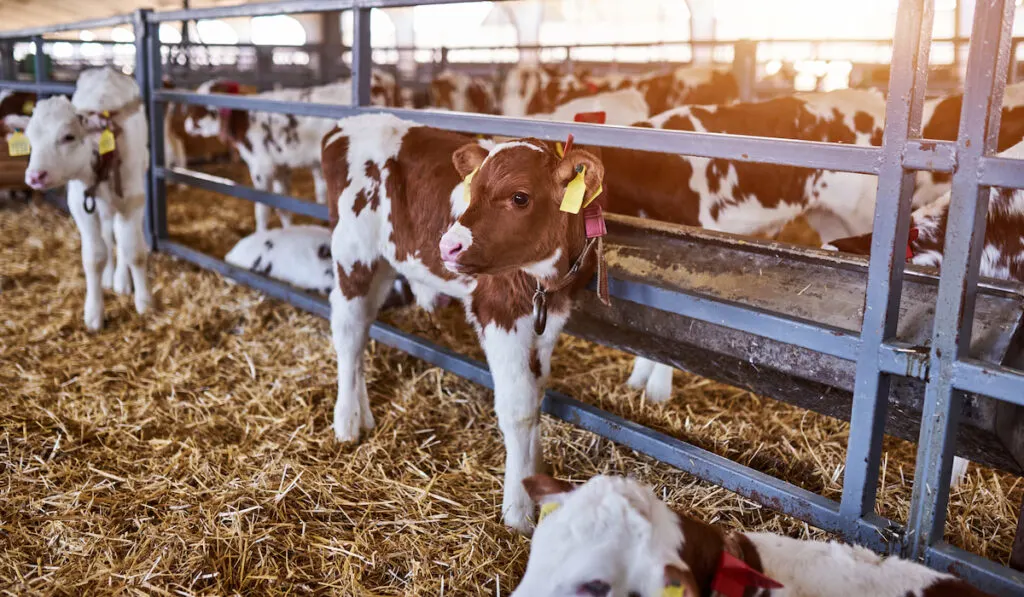Do you have calves but not know what to feed them? If you have lactating does, you may be tempted to raise your calves with the milk from your goats. Is it safe to use goat milk to raise calves? Is goat milk sufficient for calves?
Can a calf have goat milk?
It is very safe to raise calves on goat milk because goat milk offers even more nutrients than cow milk. From the experience of many farmers, raising calves with goat milk does not cause any nutrient deficiency or disease.

Table of Contents
Raising Calves on Goat Milk
Is the milk produced by just one lactating doe sufficient to raise a calf? When and how should you wean off your calves?
It’s important to know that your calves are getting what they need from the milk you are feeding them.
Goat Milk vs. Cow Milk
To decide if calves can feed on goat milk, it’s important to understand the nutritional details of goat milk and cow milk. If cow milk offered more nutrients, it would not be ideal to raise calves using goat milk.
The table below compares the nutrient composition of cow milk and goat milk. Note that milk samples of 1 cup (244g) were used for the analysis.
| Component | Unit | Cow Milk | Goat Milk |
| Fat | g | 7.93 | 10.10 |
| Water | g | 215.50 | 212.35 |
| Energy | Kcal | 146 | 168 |
| Protein | g | 7.86 | 8.69 |
| Vitamins | g | 1.61 | 1.56 |
| Minerals | g | 1.68 | 2.00 |
| Carbohydrates | g | 11.03 | 10.86 |
As you can see from the table, goat milk and cow milk are not very different. Goat milk has more fat, energy, protein, and minerals than cow milk. Cow milk has slightly more water, vitamins, and carbohydrates than goat milk.
Since different breeds of goats and cows produce milk with different compositions (but all milk produced are similar to the details in the table above), calves can comfortably thrive with goat milk.
Should you dilute goat milk before feeding calves? Some farmers and vets argue that the fat content in goat milk can cause scours if calves take too much of it, so they dilute 20% of the milk with water (i.e. four part milk with one part water).
Other farmers and vets, however, say that they have raised their calves comfortably without diluting with water.
You should consult a vet to determine whether your cow breed can feed on the milk of your goat breed with dilution or not. Check the effects of diluting (or not diluting) the milk and see which is best for your calves.

Mode of Feeding Calves with Goat Milk
Now you know that you can raise your calves using goat milk. How do you feed the calves? Should the calves suck the milk directly from the lactating doe or should you bottle-feed them?
Directly From a Doe
Calves can suck milk directly from the udder of a lactating goat. After a few tries (of the calf sucking from the doe), the doe might adopt the calf and take it as her own.
Some farmers observed that some mother goats would allow their adopted calf to collect milk while chasing away other calves.
If you want your young cows to take milk directly from a lactating doe, you will need to place the doe on higher ground in order for the calf to access the doe’s udder.
Bottle-Feeding Calves
This is indeed the easiest and safest method to feed calves. I call it easy and safe because as calves grow large, they can become uncomfortable when feeding on the udders of a doe. The lactating doe can also begin to feel uncomfortable.
By bottle-feeding calves, you can measure how much milk they consume and also manage their feeding schedule.
You need to provide colostrum to the calves. Colostrum is the first milk produced by goats and other mammals. Colostrum contains the needed amount of nutrients to boost the immune system of young animals (and humans).
Whether you are bottle-feeding calves or allowing them to feed directly from a doe, you should give them access to colostrum.

Is the Milk Produced by One Doe Sufficient for a Calf?
First of all, we have to know how much milk calves need. Ideally, calves need at least 10% of their body weight daily until you are ready to wean them off. This means that a calf weighing 90 pounds will need at least 9 pounds of milk daily.
9 pounds of milk should be about 4.5 quarts, so you should give calves weighing 90 pounds about 4.5 quarts daily (i.e. 2.25 quarts twice daily).
Remember that as the calves grow (increase in size and weight), the milk given to them should increase.
How much milk do goats produce? Can one lactating doe produce at least 4.5 quarts of milk daily? The table below compares the quantity of milk produced by different goat breeds:
| Goat Breed | Daily Milk Quantity (Oz) | Total Milk Quantity (Oz) | Length of Lactation (Days) |
| Alpine | 5.86 | 1325 | 248 |
| Nubian | 1.98 | 1305 | 270-305 |
| Maltese | 4.9 | 623 | 250 |
| Damascus | 4.1 | 833 | 270 |
| La Mancha | 5.8 | 1587-1763 | 270-305 |
| Toggenburg | 4.0 | 934 | 245 |
| Charmoisée | 5.6 | 1377 | 645 |
As you can see from the table above, you cannot get enough daily milk for a calf that weighs 90 pounds (the calf needs at least 9 pounds of milk daily) from just one lactating doe.
This means that you will need at least 2-3 lactating does (depending on the breed).
Weaning Off Calves
Can you feed your calf with goat milk until it is ready to be weaned off? If you view the table above, the last column lists the number of days different goat breeds lactate.
The ideal natural time to wean calves is 7-8 months after birth. However, according to the University of Nebraska-Lincoln, you can wean calves off as early as 45 days after birth.
Before weaning off, you must have given your calf access to fresh grass for 2 weeks.
Calves must have already started to consume grass before they are weaned so that their rumen can obtain beneficial microbes to digest their feed (the feed they eat after they are completely weaned).
If you do not give your calves access to fresh grass, they may be unable to fully digest most feeds, causing a nutrient deficiency.
You should give dry feeds such as grains and legumes to your calves after weaning them off because they are rich in protein and will encourage quicker growth.

Can You Raise Calves with Goat Milk Replacer?
I see no reason why you should raise calves with goat milk replacer. If you do not have natural cow milk or goat milk to give your calves, give them cow milk replacer.
Is it safe to raise cows with goat milk replacer? According to the reports of various farmers, raising cows with goat milk replacer has caused many problems such as nutrient deficiency and stunted growth. You should not give goat milk replacer to your calves.
Final Thoughts
It is completely safe to give goat milk to your calf. Goat milk has almost equal (or more) nutrients than cow milk, so you have nothing to fear. You should have at least 2-3 lactating does per calf for sufficient milk. Never give your calves goat milk replacer.
